Watch: Alex Salmond backs Jerusalem as English national anthempublished at 17:20
Salmond calls for Jerusalem to be English national anthem
Labour says Ken Livingstone will not have a formal role in its defence review, which will consider policy on Trident
Shadow defence secretary Emily Thornberry says the review will be based on evidence and will aim to publish its interim findings in June
Jean-Claude Juncker says agreement on the UK's EU re-negotiations is likely next month
More than a million benefits claimants may be facing destitution after disappearing from the welfare system, Labour ex-minister Frank Field claims.
Head teachers warn the system for creating new school places in England is fragmented and confusing, risking harm to children's education
Jackie Storer and Gavin Stamp
Salmond calls for Jerusalem to be English national anthem
Strathcylde report debate
 House of Lords
House of Lords
Parliament
Labour's Lord Grocott says the report proposes "very substantial constitutional change" that will transfer power from Parliament to executive.
He says there have been two Tory government defeats on statutory instruments in 41 years which "isn't enough to get into a lather about".
He tells the governments don't like being defeated, but he says the system "ain't broke, so don't fix it".
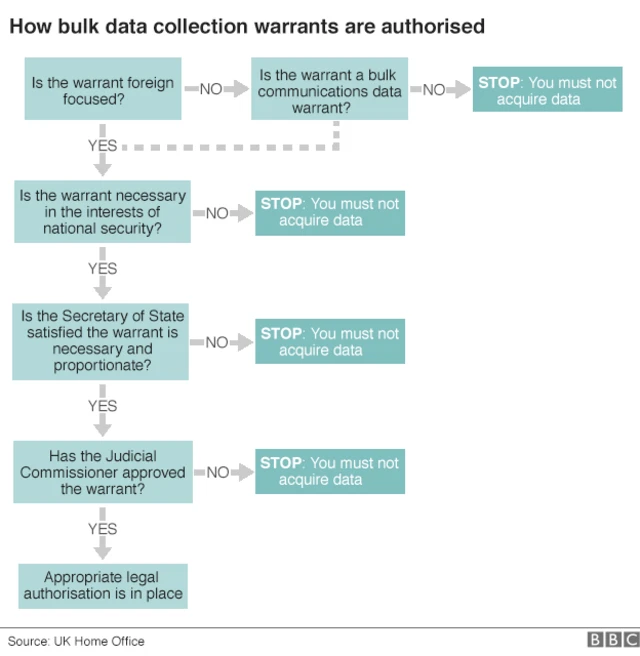
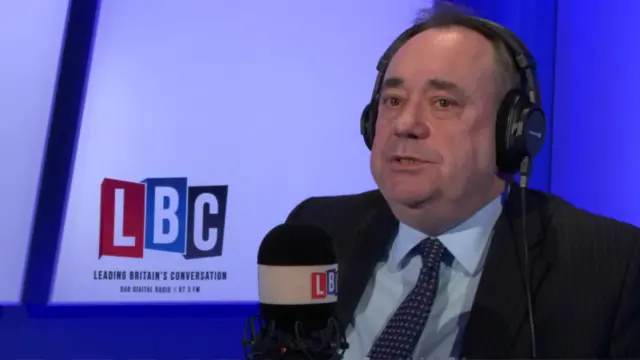 Image source, LBC
Image source, LBCSpeaking in his first weekly LBC phone-in, the former SNP leader, Alex Salmond MP has said that he supports the Labour MP, Toby Perkins' proposal to have an English national anthem and that he would vote for "Jerusalem', what he described as "a William Blake masterpiece."
Strathclyde report debate
 House of Lords
House of Lords
Parliament
Former Lord Speaker Baroness Hayman says if the House of Lords is to be asked to give up it's "rare" freedom to completely reject statutory instruments, it should only do so if it knows that scrutiny of statutory instruments would be improved dramatically.
She adds that the use of statutory instruments has gone "way beyond" their original purpose, cumulating in the tax credits vote.
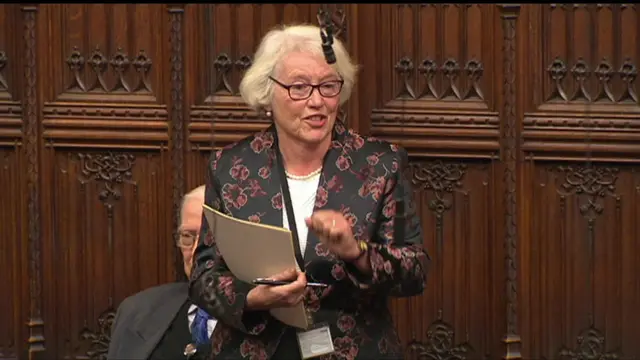
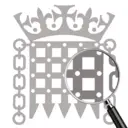 Select Committee
Select Committee
Parliament
The government will provide "reasonable cost recovery" for internet companies to store records, Theresa May tells the MPs and peers. David Hanson, a Labour MP, says some companies have warned of the high cost of the move, and questions the budget set out in the draft bill of £247m. He says there was a "nervousness" that they could deliver what is required on time and on budget.
Draft Investigatory Powers Bill
 Select Committee
Select Committee
Parliament
The intention of this is not to find people's web browsing history, Theresa May says, in response to the SNP's Stuart C McDonald. She says she is happy to provide examples of how so-called internet connection records are useful for the authorities.
Draft Investigatory Powers Bill
 Select Committee
Select Committee
Parliament
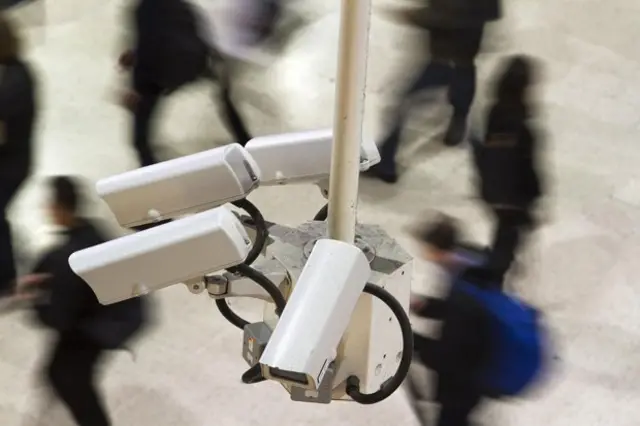 Image source, Demotix Images
Image source, Demotix ImagesThe committee has accused the government of trying to "steamroll" the new investigatory powers through Parliament, according to a report in The Times today, external (paywall).
A member of the committee said:
Quote MessageIt’s 300 pages long and has considerably more powers than the last bill. But the last committee had five months [to consider the bill] and we only have two. It’s all being done at breakneck speed. The result will be that the report produced will not be as thorough as it should be.”
According to the Times, a Home Office spokesman said:
Quote MessageIn November 2015 both Houses of Parliament agreed the schedule. The Home Office has not received correspondence from the committee requesting more time since the deadline was agreed.”
Draft Investigatory Powers Bill Committee
 Select Committee
Select Committee
Parliament
 Image source, Parliament
Image source, ParliamentThis joint committee session, examining the Draft Investigatory Powers Bill, is its final session, hearing from the Home Secretary Theresa May.
The committee has already heard from information and security experts including the Information Commissioner, a retired Director of the US National Security Agency, representatives of the NSPCC and Amnesty International, the Metropolitan Police, telecoms and broadcasting companies.
Theresa May insists the Investigatory Powers legislation is clear about what Internet Connection Records (ICR) are.
The committee has heard evidence from industry figures who have said they have no idea what is meant by ICRs - making it difficult for them to comply with the proposed law.
The industry would be required to store records of all web domains visited by people in the UK for a year.
Ms May says ICRs do not refer to individual websites visited by people.
Strathclyde report debate
 House of Lords
House of Lords
Parliament
Conservative Lord Wakeham is speaking about his Royal Commission report into the future of the House of Lords, written in 2000, external.
He says it featured a proposal about secondary legislation "not very dissimilar" to Lord Strathclyde's third option. He says he felt parts of the system were "at breaking point even then".
"The Lords' role is to review, and if not satisfied to ask the Commons to think again," he says.
Draft Investigatory Powers Bill Committee
 Select Committee
Select Committee
Parliament
Lord Murphy of Torfaen, external (Chairman) Labour
Victoria Atkins MP, external Conservative
Suella Fernandes MP, external Conservative
Rt Hon David Hanson MP, external Labour
Shabana Mahmood MP, external Labour
Stuart C McDonald MP, external SNP
Dr Andrew Murrison MP, external Conservative
Matt Warman MP, external Conservative
Baroness Browning, external Conservative
Lord Butler of Brockwell, external Crossbench
Bishop of Chester, external Bishops
Lord Hart of Chilton, external Labour
Lord Henley, external Conservative
Lord Strasburger, external Liberal Democrat
 House of Commons
House of Commons
Parliament
Theresa May is asked by Labour MP David Hanson about people's privacy fears over the Investigatory Powers Bill. She says there will be "enhanced" authorisation by a judicial commissioner and the secretary of state, as well as oversight by a new commissioner and the Intelligence and Security Committee.
 House of Commons
House of Commons
Parliament
Home Secretary Theresa May is appearing before the Draft Investigatory Powers Bill Select Committee. You can watch on the live coverage tab above.
The bill sets out the powers the UK state will have to monitor communications between citizens. Here is a guide to what it would do.
Security minister John Hayes and Labour's Jon Ashworth discuss
The upcoming EU referendum and a vote on Trident threaten to divide both the cabinet and the shadow cabinet. Daily Politics presenters Jo Coburn and Andrew Neil spoke to guests of the day security minister John Hayes and Labour shadow minister without portfolio Jon Ashworth about the loosening of collective responsibility.
 The World at One
The World at One
BBC Radio 4
Labour's shadow education secretary Lucy Powell MP discusses the junior doctors' strike.
Allow X content?
This article contains content provided by X. We ask for your permission before anything is loaded, as they may be using cookies and other technologies. You may want to read X’s cookie policy, external and privacy policy, external before accepting. To view this content choose ‘accept and continue’.
Quote MessageIt is the normal practice when a government department proposes to make a gift of a value exceeding £300,000 for the department concerned to present to the House of Commons a minute giving particulars of the gift and explaining the circumstances; and to refrain from making the gift until fourteen parliamentary sitting days after the issue of the minute, except in cases of special urgency. The crisis in Syria is having a direct effect on its neighbours, particularly in areas adjacent to Lebanon’s eastern border. The UK remains firmly committed to Lebanon’s stability, and in supporting the Lebanese Armed Forces (LAF) to minimise contagion from the Syrian conflict, and to combat the spread of Daesh. As part of this commitment, since 2012, the UK has been assisting the LAF, through the Rapid Land Border Security Assistance Project, to establish and mentor the LAF Land Border Regiments (LBRs). The mission of the LBRs is to observe, identify, deter and deny activities by illegal armed actors in the near border areas, in line with agreed international human rights standards. Between 2012 and 2015 around £26m of Conflict Pool and Conflict Security Stability funds were allocated to provide observation, protection, mobility and communications equipment to 1, 2, and 3LBRs, and to establish the lead elements of a 4th LBR, as well as a programme of training and mentoring. The command element of 4LBR has been established, and 4LBR is preparing its deployment plan to cover the remaining 25% of the borders with Syria from Arsal to Masnaa. Recent actions in the Arsal area, and the threat that Daesh poses to UK interests, make it imperative that the LAF completes the expansion of the LBRs southwards, as part of an overall strategy to bring the entire eastern border with Syria back under the authority of the State. Subject to assessment under the Consolidated EU and National Arms Export Licensing Criteria, we intend to gift a package of £967,450.00 of Personal protection equipment to start the establishment of the 4th Land Border Regiment of the Lebanese Armed Forces. The proposed gift will be funded by the Government’s Conflict, Security and Stability Fund and will consist of the following UK sourced equipment: Personal Protective Equipment. £967,450.00 The proposed gift is being scrutinised to ensure that it is consistent with export controls and complies with our international obligations. The proposed gift has been scrutinised and approved by a senior, cross-Whitehall Conflict, Stability and Security Fund (CSSF) Approval Board, which has confirmed that it fits with the Government’s strategic and delivery objectives. Foreign and Commonwealth Office officials also assessed the project for human rights risks, using the Overseas Security and Justice Assistance guidelines established by the Foreign Secretary in 2011. The Treasury has approved the proposal in principle. If, during the period of 14 parliamentary sitting days beginning on the date on which this minute was laid before the House of Commons, a Member signifies an objection by giving notice of a Parliamentary Question or a Motion relating to the minute, or by otherwise raising the matter in the House, final approval of the gift will be withheld pending an examination of the objection."
 House of Lords
House of Lords
Parliament
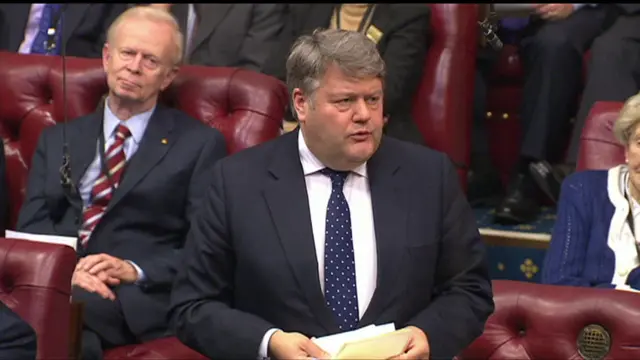
A debate on Lord Strathclyde's recommendations is now under way in the House of Lords. He said the issue goes to the "heart" of what members are there for.
Queries claim of successful hydrogen bomb test
Quote MessageAt 0400 GMT on 6 January North Korean state media claimed that it had successfully conducted its first hydrogen bomb test at 0130 GMT. The Comprehensive Test Ban Treaty Organisation reported seismic signatures with a magnitude of 4.85, consistent with previous North Korean nuclear tests. We assess that the size of the seismic event caused by the nuclear test, while indicative of a nuclear explosion, is not indicative of the successful test of a thermonuclear weapon (also known as a hydrogen bomb); however this nuclear test is a serious violation of UN Security Council resolutions 1718, 1874, 2087 and 2094. North Korea’s nuclear and ballistic missile programme poses a significant threat to international security and regional stability. North Korea’s repeated provocations hinder the prospects for lasting peace on the Korean peninsula. On 6 January I issued a statement strongly condemning the nuclear test as a grave breach of UN Security Council resolutions. While travelling in the region last week I spoke to my South Korean, Japanese and Chinese counterparts about the international response. I have also spoken to the US Secretary of State. The Minister of State for Foreign and Commonwealth Affairs, my right hon. Friend the Member for East Devon (Mr Swire), summoned the North Korean Ambassador to the Foreign and Commonwealth Office on 7 January in order to underline, in the strongest terms, the UK’s firm condemnation of this nuclear test and to make clear to North Korea that it can either engage constructively with the international community, or face increasing isolation and further action by the international community. We worked to secure, and strongly support, the UN Security Council’s swift condemnation of this nuclear test in its statement following its emergency meeting on 6 January. The Security Council agreed that this North Korean nuclear test was a clear violation of existing Security Council resolutions; and that there should be a robust response including immediate work on further significant measures in a new Security Council resolution. The UK remains deeply concerned by North Korea’s continued development of its nuclear and ballistic missile programmes. We continue to urge North Korea to return to credible and authentic multilateral talks on its nuclear programme, to abide by its obligations under the Nuclear Non-Proliferation Treaty, and to permit full access by the International Atomic Energy Agency."